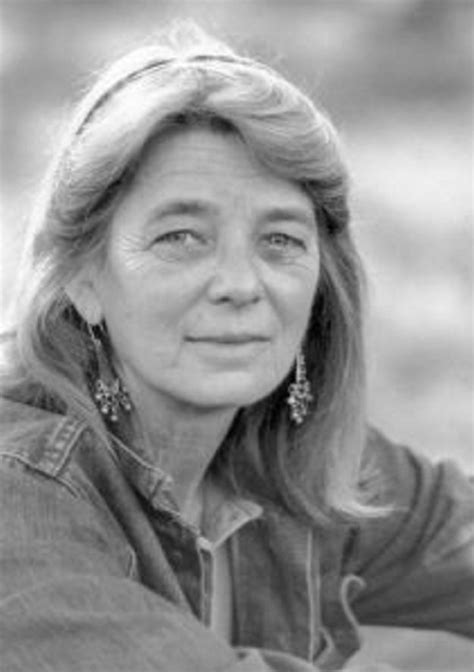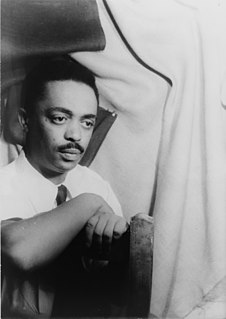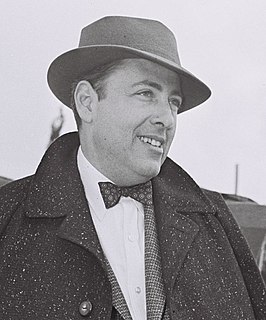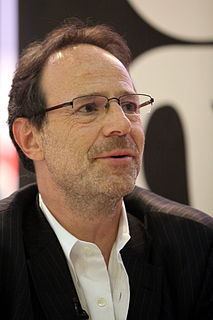A Quote by Sue Hubbell
It wasn't that there weren't menfolk in my grandmother's stories. There were lots of them but they died young or were drifters and dreamers who disappeared or turned to drink or succumbed to melancholia or slow mortal diseases. The women, on the other hand, lived a long time and were full of spit and vinegar until the end.
Related Quotes
My nana was always a widow as long as I was alive; my grandfather died before I was born. All the women on my street - there were four houses in a row with all old women who lived alone who were widowed. They all had kids, but they were all widowed. My mom didn't put me in preschool; I didn't know that was a thing. I just hung out with these women all day.
For women to be supplying the soldiery with banners, flannel shirts and other material comforts was, superficially, all of a piece with their ministrations to their menfolk at home. Such contributions to the war effort were socially acceptable because they could be seen as an extension into the military sphere of the traditional female virtues of charity, nurture and needlework. Yet in reality what the women were doing represented the thin end of a far more radical wedge. Consciously or not, these female patriots were staking out a civic role for themselves. And many of them relished it.
The beginning of my love for football goes back to when I was seven years old. I was spending time with my grandmother, Caletha Vick. I never knew anything about the game until one Sunday afternoon when she turned on the television because the Redskins were playing. They were my Uncle Casey's favorite team-and my grandmother's favorite too. After watching the game with them, I was hooked.
Let us fill a cup and drink to that most noble, ridiculous, laughable, sublime figure in our lives... The Young Man Who Was. Let us drink to his dreams, for they were rainbow-colored; to his appetites, for they were strong; to his blunders, for they were huge; to his pains for they were sharp; to his time for it was brief; and to his end, for it was to become one of us.
My mother died yesterday, yesterday many years ago. You know, what amazed me the most the next day after her leaving was the fact that the buildings were still in place, the streets were still full of cars running, full of people who were walking, seemingly ignoring that my whole world has just disappeared." (rough translation)
There were others, women with stories that were told in a quieter voice: women who hid Jewish children in their homes, putting themselves directly in harm's way to save others. Too many of them paid a terrible, unimaginable price for their heroism. And like so many women in wartime, they were largely forgotten after the war's end.There were no parades for them, very few medals, and almost no mention in the history books.
It just struck me as really odd that there were all of these conversations going on about what young women were up to. Were young women having too much sex? Were young women politically apathetic? Are young women socially engaged or not? And whenever these conversations were happening, they were mostly happening by older women and by older feminists. And maybe there would be a younger woman quoted every once in a while, but we weren't really a central part of that conversation. We weren't really being allowed to speak on our own behalf.
The newspaper stories were like dreams to us, bad dreams dreamt by others. How awful, we would say, and they were, but they were awful without being believable. They were too melodramatic, they had a dimension that was not the dimension of our lives. We were the people who were not in the papers. We lived in the blank white spaces at the edges of print. It gave us more freedom. We lived in the gaps between the stories.
There were the days when women were under contract, and they were thought of as a commodity, so they hired the best writers and a lot of them were women at the time. This was in the thirties and forties, to make product for the people who were under contract, who were their assets to the studios. But that doesn't exist anymore - and as a result, the people who are in the industry write products that interest them.
Where did all the women come from? The supply was endless. Each one of them was individual, different. Their pussies were different, their kisses were different, their breasts were different, but no man could drink them all, there were too many of them, crossing their legs, driving men mad. What a feast!
When the feminist movement was at its zenith in the late 60's and early 70's, there was a lot of moving away from the idea of the person. It was: let's talk about the ideas behind the work, and the people matter less. It was kind of a gimmicky thing, but lots of feminist women were doing it. Many of us took the names of our female ancestors - bell hooks is my maternal great grandmother - to honor them and debunk the notion that we were these unique, exceptional women. We wanted to say, actually, we were the products of the women who'd gone before us.
Long before I became a feminist in any explicit way, I had turned from writing love stories about women in which women were losers, and adventure stories about men in which the men were winners, to writing adventure stories about a woman in which the woman won. It was one of the hardest things I ever did in my life.
People "died" all the time. . . . Parts of them died when they made the wrong kinds of decisions-decisions against life. Sometimes they died bit by bit until finally they were just living corpses walking around. If you were perceptive you could see it in their eyes; the fire had gone out. . . you always knew when you made a decision against life. The door clicked and you were safe inside-safe and dead.
It was a wonderful time to be young. The 1960s didn't end until about 1976. We all believed in Make Love Not War - we were idealistic innocents, darling, despite the drugs and sex. We were sweet lovely people who wanted to throw out all the staid institutions who placed money and wars above all else. When you're young you think that's how life works. None of us were famous, we were broke. We didn't think they'd be writing books about us in 30 years. We were just kids doing the right thing.



































